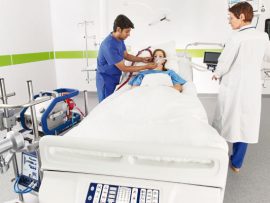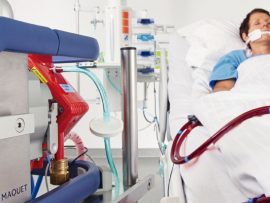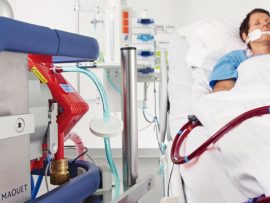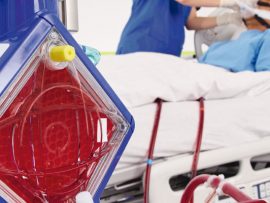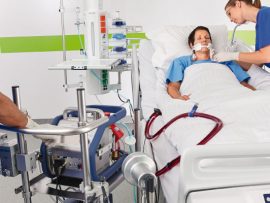Abstract Purpose To assess whether prone positioning (PP) increases bleeding risk compared to supine positioning in ARDS patients undergoing veno venous Extracorporeal Membrane Oxygenation (VV ECMO). Materials and Methods A..
Lire la suiteAbstract Purpose The evidence supporting the benefit on clinical outcomes of prone positioning during veno-venous extracorporeal membrane oxygenation (V-V ECMO) for acute hypoxemic respiratory failure remains inconclusive. We aimed to..
Lire la suiteAbstract Purpose: The evidence supporting the benefit on clinical outcomes of prone positioning during veno-venous extracorporeal membrane oxygenation (V-V ECMO) for acute hypoxemic respiratory failure remains inconclusive. We aimed to..
Lire la suiteAbstract Background Acute respiratory distress syndrome (ARDS) is a severe lung condition characterized by diffuse alveolar damage and hypoxemia. Venovenous extracorporeal membrane oxygenation (vv-ECMO) supports gas exchange and reduces ventilator-induced..
Lire la suiteAbstract Building solid evidence in intensive care medicine is challenging, mostly due to patient heterogeneity and concomitant treatment interactions. In the context of acute respiratory distress syndrome (ARDS), only two..
Lire la suiteAbstract In critically ill patients with moderate to severe acute respiratory distress syndrome (ARDS) receiving invasive mechanical ventilation, prone positioning for 16 hours/day has been shown to confer significant mortality..
Lire la suiteAbstract Aims To evaluate the feasibility of a transthoracic echocardiogram using an apical‑subcostal protocol in invasive mechanical ventilation (IMV) and prone position. Methods Prospective study of adults who required a..
Lire la suitePRO Building solid evidence in intensive care medicine is challenging, mostly due to patient heterogeneity and concomitant treatment interactions. In the context of acute respiratory distress syndrome (ARDS), only two..
Lire la suiteAbstract Background: This study aimed to investigate the effects of prone position ventilation treatment on patients with acute respiratory distress syndrome (ARDS) after cardiac surgery. Methods: Clinical data were collected from 93..
Lire la suiteAbstract Importance Prone positioning may improve outcomes in patients with severe acute respiratory distress syndrome (ARDS), but it is unknown whether prone positioning improves clinical outcomes among patients with ARDS who..
Lire la suiteAbstract Hemodynamics is a key factor in the management of acute respiratory distress syndrome (ARDS), as hemodynamic compromise is associated with mortality and its incidence is between 50 and 70%..
Lire la suiteAbstract Persistent hypoxemia during veno-venous extracorporeal membrane oxygenation (VV-ECMO) for supporting acute respiratory distress syndrome (ARDS) patients is a clinical challenge for intensive care medical providers. Prone positioning is an..
Lire la suiteAbstract Prone positioning is an immediately accessible, readily implementable intervention that was proposed initially as a method for improvement in gas exchange > 50 years ago. Initially implemented clinically as..
Lire la suiteAbstract OBJECTIVES: Prone positioning and venovenous extracorporeal membrane oxygenation (ECMO) are both useful interventions in acute respiratory distress syndrome (ARDS). Combining the two therapies is feasible and safe, but the..
Lire la suiteAbstract OBJECTIVES: The study investigated the impact of prone positioning during venovenous extracorporeal membrane oxygenation support for coronavirus disease 2019 acute respiratory failure on the patient outcome. DESIGN: An observational..
Lire la suiteAbstract We read with great interest the paper of Giani and colleagues titled "Prone positioning during venovenous extracorporeal membrane oxygenation for acute respiratory distress syndrome: a pooled individual patient data..
Lire la suiteAbstract Purpose Previous studies support the potential efficacy of venovenous extracorporeal membrane oxygenation (vvECMO) for improving survival in severe acute respiratory distress syndrome (ARDS) cases. Prone positioning (PP) has been..
Lire la suiteAbstract Objectives: The study investigated the impact of prone positioning during venovenous extracorporeal membrane oxygenation support for coronavirus disease 2019 acute respiratory failure on the patient outcome. Design: An observational..
Lire la suiteAbstract This article is one of ten reviews selected from the Annual Update in Intensive Care and Emergency Medicine 2021. Other selected articles can be found online at https:// www...
Lire la suiteAbstract There is sufficient evidence to show that prone positioning improves oxygenation and respiratory mechanics and is also associated with lower mortality in patients with moderate to severe ARDS. However,..
Lire la suiteAbstract Prone position quickly imposed as a cornerstone in the management of patients with acute respiratory distress syndrome (ARDS) induced by coronavirus disease 2019 (COVID-19) [1, 2]. The response to..
Lire la suiteAbstract Prone position quickly imposed as a cornerstone in the management of patients with acute respiratory distress syndrome (ARDS) induced by coronavirus disease 2019 (COVID-19) [, ]. The response to prone..
Lire la suiteAbstract The coronavirus disease 2019 (COVID-19), caused by severe acute respiratory syndrome coronavirus 2 (SARS-CoV-2), has already become a global pandemic as a public health emergency of international concern. Previous..
Lire la suiteAbstract Rationale: Current practices regarding mechanical ventilation in patients treated with extracorporeal membrane oxygenation (ECMO) for acute respiratory distress syndrome are unknown. Objectives: To report current practices regarding mechanical ventilation in patients..
Lire la suiteAbstract A morbidly obese middle aged woman in her 40's presented to another hospital with and subsequently developed severe . Her oxygenation demonstrated no improvement with low ventilation, paralysis, or prostagladin therapy. She..
Lire la suite
